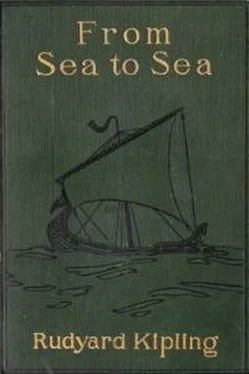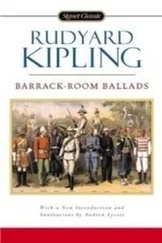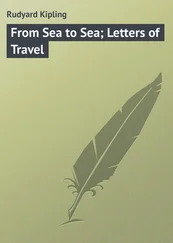Джозеф Киплинг - From Sea to Sea
Здесь есть возможность читать онлайн «Джозеф Киплинг - From Sea to Sea» весь текст электронной книги совершенно бесплатно (целиком полную версию без сокращений). В некоторых случаях можно слушать аудио, скачать через торрент в формате fb2 и присутствует краткое содержание. Год выпуска: 2014, Издательство: epubBooks Classics, Жанр: Биографии и Мемуары, Публицистика, на английском языке. Описание произведения, (предисловие) а так же отзывы посетителей доступны на портале библиотеки ЛибКат.
- Название:From Sea to Sea
- Автор:
- Издательство:epubBooks Classics
- Жанр:
- Год:2014
- ISBN:нет данных
- Рейтинг книги:3 / 5. Голосов: 1
-
Избранное:Добавить в избранное
- Отзывы:
-
Ваша оценка:
- 60
- 1
- 2
- 3
- 4
- 5
From Sea to Sea: краткое содержание, описание и аннотация
Предлагаем к чтению аннотацию, описание, краткое содержание или предисловие (зависит от того, что написал сам автор книги «From Sea to Sea»). Если вы не нашли необходимую информацию о книге — напишите в комментариях, мы постараемся отыскать её.
From Sea to Sea — читать онлайн бесплатно полную книгу (весь текст) целиком
Ниже представлен текст книги, разбитый по страницам. Система сохранения места последней прочитанной страницы, позволяет с удобством читать онлайн бесплатно книгу «From Sea to Sea», без необходимости каждый раз заново искать на чём Вы остановились. Поставьте закладку, и сможете в любой момент перейти на страницу, на которой закончили чтение.
Интервал:
Закладка:
Then came a great blasted heath whereon nothing was more than six inches high—a wilderness covered with grass and low thorn; and here, as nearly as might be midway between Chitor and Udaipur, the Wheel of Fate, which had been for some time beating against the side of the tonga, came off, and Her Majesty's mails, two bags including parcels, collapsed on the wayside: while the Englishman repented him that he had neglected the omens of the vultures and the raven, the low–caste man and the mad driver.
There was a consultation and an examination of the wheel, but the whole tonga was rotten, and the axle was smashed and the axle pins were bent and nearly red–hot. "It is nothing," said the driver, "the mail often does this. What is a wheel?" He took a big stone and began hammering proudly on the tire, to show that that at least was sound. A hasty court–martial revealed that there was absolutely not one single relief vehicle on the whole road between Chitor and Udaipur.
Now this wilderness was so utterly waste that not even the barking of a dog or the sound of a night–fowl could be heard. Luckily the Thakur had, some twenty miles back, stepped out to smoke by the roadside, and his tonga had been passed meanwhile. The sowar was sent back to find that tonga and bring it on. He cantered into the haze of the moonlight and disappeared. Then said the driver: "Had there been no tonga behind us, I should have put the mails on a horse, because the Sirkar's mail cannot stop." The Englishman sat down upon the parcels–bag, for he felt that there was trouble coming. The driver looked East and West and said: "I, too, will go and see if the tonga can be found, for the Sirkar's dak cannot stop. Meantime, oh, Sahib, do you take care of the mails—one bag and one bag of parcels." So he ran swiftly into the haze of the moonlight and was lost, and the Englishman was left alone in charge of Her Majesty's mails, two unhappy ponies, and a lop–sided tonga. He lit a fire, for the night was bitterly cold, and only mourned that he could not destroy the whole of the territories of His Highness, the Maharana of Udaipur. But he managed to raise a very fine blaze, before he reflected that all this trouble was his own fault for wandering into Native States undesirous of Englishmen.
The ponies coughed dolorously from time to time, but they could not lift the weight of a dead silence that seemed to be crushing the earth. After an interval measurable by centuries, sowar, driver, and Thakur's tonga reappeared; the latter full to the brim and bubbling over with humanity and bedding. "We will now," said the driver, not deigning to notice the Englishman who had been on guard over the mails, "put the Sirkar's mail into this tonga and go forward." Amiable heathen! He was going—he said so—to leave the Englishman to wait in the Sahara, for certainly thirty hours and perhaps forty–eight. Tongas are scarce on the Udaipur road. There are a few occasions in life when it is justifiable to delay Her Majesty's Mail. This was one of them. Seating himself upon the parcels–bag, the Englishman cried in what was intended to be a very terrible voice, but the silence soaked it up and left only a thin trickle of sound, that any one who touched the bags would be hit with a stick, several times, over the head. The bags were the only link between him and the civilisation he had so rashly foregone. And there was a pause.
The Thakur put his head out of the tonga and spoke shrilly in Mewari. The Englishman replied in English–Urdu. The Thakur withdrew his head, and from certain grunts that followed seemed to be wakening his retainers. Then two men fell sleepily out of the tonga and walked into the night. "Come in," said the Thakur, "you and your baggage. My pistol is in that corner; be careful." The Englishman, taking a mail–bag in one hand for safety's sake,—the wilderness inspires an Anglo–Indian Cockney, with unreasoning fear,—climbed into the tonga, which was then loaded far beyond Plimsoll mark, and the procession resumed its journey. Every one in the vehicle—it seemed as full as the railway carriage that held Alice through the Looking–Glass—was Sahib and Hazur . Except the Englishman. He was simple tum (thou), and a revolver, Army pattern, was printing every diamond in the chequer–work of its handle, on his right hip. When men desired him to move, they prodded him with the handles of tulwars till they had coiled him into an uneasy lump. Then they slept upon him, or cannoned against him as the tonga bumped. It was an aram tonga, a tonga for ease. That was the bitterest thought of all!
In due season the harness began to break once every five minutes, and the driver vowed that the wheels would give way also.
After eight hours in one position, it is excessively difficult to walk, still more difficult to climb up an unknown road into a dak–bungalow; but he who has sought sleep on an arsenal and under the bodies of burly Rajputs can do it. The grey dawn brought Udaipur and a French bedstead. As the tonga jingled away, the Englishman heard the familiar crack of broken harness. So he was not the Jonah he had been taught to consider himself all through that night of penance!
A jackal sat in the verandah and howled him to sleep, and he dreamed that he caught a Viceroy under the walls of Chitor and beat him with a tulwar till he turned into a dak–pony whose near foreleg was perpetually coming off and who would say nothing but tum when he was asked why he had not built a railway from Chitor to Udaipur.
VII
Touching the Children of the Sun and Their City, and the Hat-marked Caste and Their Merits, and a Good Man's Works in the Wilderness
It was worth a night's discomfort and revolver–beds to sleep upon—this city of the Suryavansi, hidden among the hills that encompass the great Pichola lake. Truly, the King who governs to–day is wise in his determination to have no railroad to his capital. His predecessor was more or less enlightened, and had he lived a few years longer, would have brought the iron horse through the Dobarri—the green gate which is the entrance of the Girwa or girdle of hills around Udaipur; and, with the train, would have come the tourist who would have scratched his name upon the Temple of Garuda and laughed horse–laughs upon the lake. Let us, therefore, be thankful that the capital of Mewar is hard to reach.
Each man in this land who has any claims to respectability walks armed, carrying his tulwar sheathed in his hand, or hung by a short sling of cotton passing over the shoulder, under his left armpit. His matchlock, or smooth–bore, if he has one, is borne naked on the shoulder.
Now it is possible to carry any number of lethal weapons without being actually dangerous. An unhandy revolver, for instance, may be worn for years, and, at the end, accomplish nothing more noteworthy than the murder of its owner. But the Rajput's weapons are not meant for display. The Englishman caught a camel–driver who talked to him in Mewari, which is a heathenish dialect, something like Multani to listen to; and the man, very gracefully and courteously, handed him his sword and matchlock, the latter a heavy stump–stock arrangement without pretence of sights. The blade was as sharp as a razor, and the gun in perfect working order. The coiled fuse on the stock was charred at the end, and the curled ram's–horn powder–horn opened as readily as a much–handled whisky–flask. Unfortunately, ignorance of Mewari prevented conversation; so the camel–driver resumed his accoutrements and jogged forward on his beast—a superb black one, with the short curled hubshee hair—while the Englishman went to the city, which is built on hills on the borders of the lake. By the way, everything in Udaipur is built on a hill. There is no level ground in the place, except the Durbar Gardens, of which more hereafter. Because colour holds the eye more than form, the first thing noticeable was neither temple nor fort, but an ever–recurring picture, painted in the rudest form of native art, of a man on horseback armed with a lance, charging an elephant–of–war. As a rule, the elephant was depicted on one side the house–door and the rider on the other. There was no representation of an army behind. The figures stood alone upon the whitewash on house and wall and gate, again and again and again. A highly intelligent priest grunted that it was a picture; a private of the Maharana's regular army suggested that it was an elephant; while a wheat–seller, his sword at his side, was equally certain that it was a Raja. Beyond that point, his knowledge did not go. The explanation of the picture is this. In the days when Raja Maun of Amber put his sword at Akbar's service and won for him great kingdoms, Akbar sent an army against Mewar, whose then ruler was Pertap Singh, most famous of all the princes of Mewar. Selim, Akbar's son, led the army of the Toork; the Rajputs met them at the pass of Huldighat and fought till one–half of their band was slain. Once, in the press of battle, Pertap on his great horse, Chytak, came within striking distance of Selim's elephant, and slew the mahout, but Selim escaped, to become Jehangir afterwards, and the Rajputs were broken. That was three hundred years ago, and men have reduced the picture to a sort of diagram that the painter dashes in, in a few minutes, without, it would seem, knowing what he is commemorating.
Читать дальшеИнтервал:
Закладка:
Похожие книги на «From Sea to Sea»
Представляем Вашему вниманию похожие книги на «From Sea to Sea» списком для выбора. Мы отобрали схожую по названию и смыслу литературу в надежде предоставить читателям больше вариантов отыскать новые, интересные, ещё непрочитанные произведения.
Обсуждение, отзывы о книге «From Sea to Sea» и просто собственные мнения читателей. Оставьте ваши комментарии, напишите, что Вы думаете о произведении, его смысле или главных героях. Укажите что конкретно понравилось, а что нет, и почему Вы так считаете.












